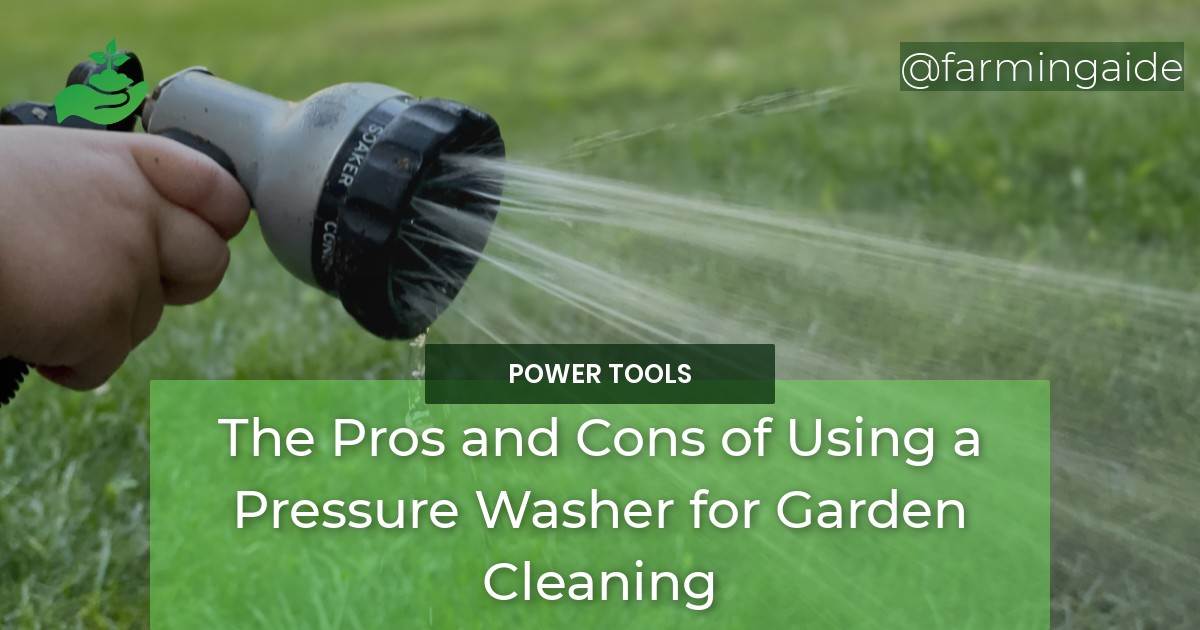Garden cleaning is an essential task that every gardener needs to do regularly to maintain the hygiene and sanitation of their garden. Pressure washing is one of the most popular methods of outdoor cleaning that can make this task much easier and save a lot of time and energy.
However, there are pros and cons of using a pressure washer for garden cleaning that one must be aware of. In this article, we will discuss the benefits and drawbacks of using a pressure washer for garden cleaning, tips for using it safely and effectively, and alternative garden cleaning methods.
Table of Contents
Advantages of Using a Pressure Washer for Garden Cleaning
Saves Time and Energy:
Pressure washing is a quick and efficient way to clean large areas of garden and outdoor surfaces within a short time. It can save a lot of time and energy compared to manual cleaning methods.
Removes Stubborn Dirt and Grime:
Pressure washing uses high-pressure water to remove dirt, grime, and other stubborn stains from garden paths, patios, walls, and other surfaces. It can easily remove moss, algae, and mold that can cause slippery surfaces and compromise safety.
Reaches Hard-to-Clean Areas:
Pressure washing can reach areas that are difficult to clean using other methods. It can clean the gaps between paving stones, corners, and edges of walls and other surfaces.
Reduces Water Usage:
Pressure washing uses less water than traditional garden cleaning methods. It can save up to 75% of water compared to a garden hose with a spray nozzle.
Disadvantages of Using a Pressure Washer for Garden Cleaning
Can Damage Plants and Surfaces:
High-pressure water can damage delicate plants, flowers, and shrubs in the garden. It can also damage surfaces that are not designed to withstand high-pressure cleaning, such as painted walls and wooden decks.
Requires Special Precautions:
Pressure washing requires special precautions to ensure safety. The high-pressure water can cause injuries to the operator or others nearby. It is important to wear protective clothing, safety goggles, and ear protection while using a pressure washer.
Not Suitable for All Surfaces:
Pressure washing is not suitable for all surfaces in the garden. It can damage surfaces such as stucco walls, delicate ornaments, and some types of paving stones.
Can be Loud and Noisy:
Pressure washing can be loud and noisy, especially if you are using a gas-powered pressure washer. It can disturb your neighbors and cause noise pollution.
Tips for Using a Pressure Washer for Garden Cleaning
Choose the Right Pressure Setting and Nozzle:
Choose the appropriate pressure setting and nozzle for the surface you are cleaning. Lower pressure is suitable for delicate surfaces, while higher pressure is suitable for tough stains.
Keep a Safe Distance from Surfaces:
Maintain a safe distance from the surface you are cleaning to prevent damage or injury. Keep a minimum of two feet from the surface and gradually move closer if necessary.
Test on a Small Area First:
Before cleaning a large area, test the pressure washer on a small area to ensure that it does not cause damage.
Protect Yourself and Others:
Wear protective clothing, safety goggles, and ear protection while using a pressure washer. Ensure that others are safe and keep pets and children away from the cleaning area.
How Can Using a Digging Bar Affect the Effectiveness of a Pressure Washer for Garden Cleaning?
When cleaning your garden with a pressure washer, the benefits of a digging bar come into play. Using a digging bar to loosen compacted soil or remove deeply rooted weeds can greatly enhance the effectiveness of the pressure washer by allowing it to reach and clean areas that would otherwise be inaccessible.
Alternative Garden Cleaning Methods
Hand Scrubbing:
Hand scrubbing is a manual cleaning method that is suitable for delicate surfaces and plants. It requires more time and effort than pressure washing but is safe and effective.
Garden Hose with Spray Nozzle:
A garden hose with a spray nozzle is a traditional garden cleaning method that is suitable for light cleaning tasks such as watering plants and rinsing surfaces.
Broom or Brush:
A broom or brush is a manual cleaning tool that is suitable for cleaning small areas or tough stains. It requires more time and effort than pressure washing but is safe and effective.
Organic Cleaning Solutions:
Organic cleaning solutions such as vinegar, lemon juice, and baking soda can be used to clean some surfaces in the garden. They are eco-friendly and safe for plants and pets.
In conclusion, Pressure washing is a popular method of garden cleaning that has many advantages and disadvantages. It is quick, efficient, and can save time and energy, but it requires special precautions and can damage plants and surfaces if not used properly. Therefore, it is important to choose the right pressure setting and nozzle, maintain a safe distance from surfaces, and wear protective clothing while using a pressure washer. If you prefer a more traditional or eco-friendly method, hand scrubbing, a garden hose, a broom or brush, or organic cleaning solutions may be suitable alternatives. Whichever method you choose, always prioritize safety, effectiveness, and sustainability in your garden maintenance and hygiene practices.


